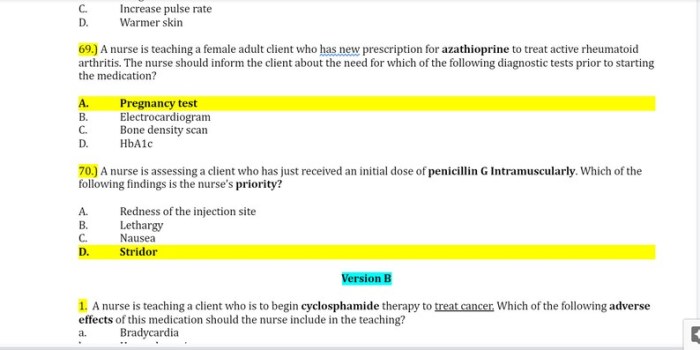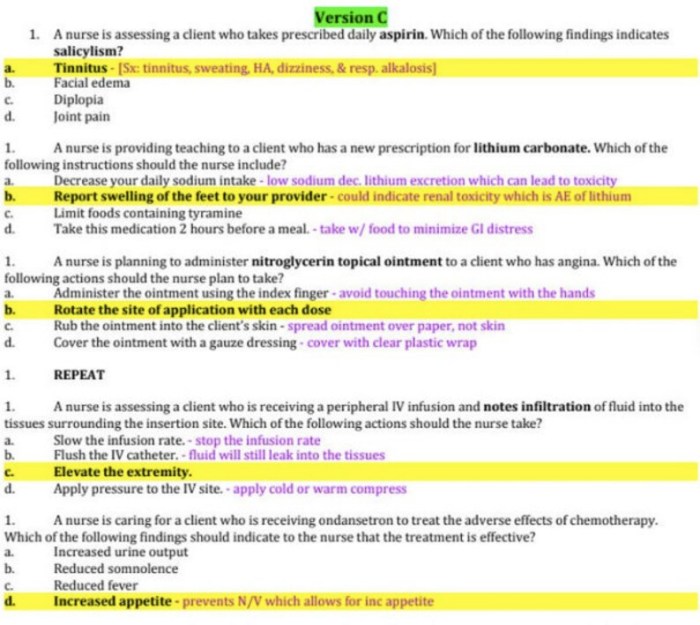The ATI RN Pharmacology Proctored Exam 2019 is a crucial milestone for nursing students and professionals seeking to enhance their pharmacological knowledge and demonstrate their competency in administering medications safely and effectively. This comprehensive exam evaluates candidates’ understanding of key pharmacological concepts, principles, and their application in clinical practice.
By providing an in-depth overview of the exam’s content, structure, and preparation strategies, this guide empowers nurses to approach the ATI RN Pharmacology Proctored Exam 2019 with confidence and achieve optimal performance.
ATI RN Pharmacology Proctored Exam 2019 Overview

The ATI RN Pharmacology Proctored Exam 2019 is a comprehensive assessment designed to evaluate the knowledge and skills of nursing students and professionals in pharmacology. This high-stakes exam is a crucial step in the nursing licensure process and plays a significant role in ensuring patient safety.
The exam covers a wide range of pharmacology concepts, including drug classifications, mechanisms of action, pharmacokinetics, pharmacodynamics, adverse effects, and nursing implications. By successfully passing this exam, nurses demonstrate their proficiency in pharmacology and their ability to provide safe and effective medication administration.
Exam Content and Structure
Content Areas
The ATI RN Pharmacology Proctored Exam 2019 covers the following content areas:
- Cardiovascular agents
- Central nervous system agents
- Anti-infectives
- Gastrointestinal agents
- Respiratory agents
- Endocrine agents
- Musculoskeletal agents
Structure
The exam consists of 150 multiple-choice questions, which must be completed within a time limit of 3 hours. The questions are distributed across the different content areas, with a focus on the most commonly used medications in nursing practice.
Exam Preparation Strategies
Effective exam preparation is crucial for success on the ATI RN Pharmacology Proctored Exam 2019. Here are some key strategies to consider:
- Utilize study materials:Study textbooks, online resources, and practice exams to cover the exam content thoroughly.
- Focus on high-yield topics:Identify the most frequently tested topics and concentrate on understanding them in-depth.
- Practice time management:Time yourself during practice exams to improve your pacing and ensure you can complete the actual exam within the time limit.
- Manage anxiety:Practice relaxation techniques, such as deep breathing and meditation, to reduce test anxiety and improve focus.
Content Analysis

An analysis of the ATI RN Pharmacology Proctored Exam 2019 reveals the following trends:
Most Frequently Tested Topics, Ati rn pharmacology proctored exam 2019
- Cardiovascular agents
- Anti-infectives
- Central nervous system agents
Difficulty Level
The exam questions range in difficulty, with approximately 60% of the questions classified as easy or medium, and the remaining 40% classified as difficult.
Performance Evaluation: Ati Rn Pharmacology Proctored Exam 2019
The ATI RN Pharmacology Proctored Exam 2019 is scored on a scale of 0-100. A score of 70% or higher is considered passing.
Exam results are typically available within 2-3 weeks of taking the exam. Candidates who do not pass the exam are provided with a detailed score report that identifies areas for improvement.
Questions and Answers
What is the purpose of the ATI RN Pharmacology Proctored Exam 2019?
The ATI RN Pharmacology Proctored Exam 2019 is designed to assess the pharmacological knowledge and skills of nursing students and professionals, ensuring their competence in medication administration and patient safety.
What content areas are covered on the exam?
The exam covers a comprehensive range of pharmacological concepts, including drug classifications, mechanisms of action, dosage calculations, adverse effects, and nursing implications.
How can I prepare effectively for the exam?
Effective preparation involves studying textbooks, utilizing online resources, practicing with mock exams, and employing time management and test-taking techniques.
How is the exam scored, and what constitutes a passing score?
The exam is scored based on the number of correct answers, and the passing score is typically set by the individual nursing program or institution.